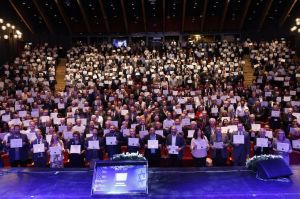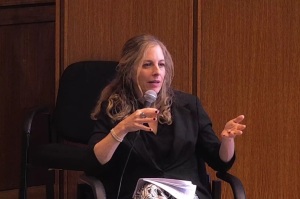N.T. Wright Lectures on Combatting Evil, Da Vinci Code, and Imagination
One of the world’s top New Testament scholars addressed
One of the world’s top New Testament scholars addressed "the dark forces of evil," the Da Vinci Code, and the beauty of Christian Imagination, during a two-day symposium at the Seattle Pacific University last week.
Anglican Bishop Dr. N.T. Wright, a world renowned author and scholar from England, was greeted by hundreds of students at the private Christian university in Seattle, WA. for the annual President’s Symposia on May 18-19, according to the campus newspaper, the Falcon.
Due to limited space, however, many were turned away by the security on the first night and encouraged to arrive at least 30 minutes early for the next day’s lecture
Decoding the Da Vinci Code
Wright kicked off the symposium with the lecture titled "Decoding the Da Vinci Code: The Challenge of Historic Christianity to Post-Modern Fantasy," focused on Dan Brown's best-selling novel, "The Da Vinci Code."
"It's not just a page-turner," Wright said. "He has made several implausible elements seem like they might be true."
He told the audience that the novel does not tell people anything new. It is just one in a long line of books about the Holy Grail, conspiracy theories within religion and hidden codes in medieval paintings, he said.
According to Wright, these types of stories often claim that the four Canonical gospels - the Biblical books of Matthew, Mark, Luke and John - are inaccuarate, and that the Gnostic gospels - recently discovered books dating back to the first century that are not included in the Bible - are the most accurate descriptions of Christ.
"The texts quoted by people like Dan Brown are not going back to the truth," Wright said. "They were written later [than the Canonical gospels] and are a step away from first-century Judaism."
The ideas of Neo-Gnosticism apparent in "The Da Vinci Code" say to focus within yourself and be true to what you find, Wright said.
However, he urged the students to look away from themselves, submit to Jesus as Lord and submit all other things to that truth.
The Bible and Christian Imagination
Wright opened up the second day of the symposium with the talk titled "The Bible and Christian Imagination."
"Why is the world beautiful?" he asked, "and how are we as Christians supposed to deal with that?"
Many Christian teachers have been scared of the imagination and denied some of the creativity that God has given us, Wright said.
"However, we are to be making new people on the basis of God making things new in Christ," he said. "And the Bible is a framework where we can start."
Christians are called not only to use their imagination when relating to people, but with all forms of art, Wright said. "Art makes you see and think things that you can't see otherwise."
Defining imagination as “a tool to reconcile the world to Christ,” Wright said "the reconciliation that is given to you is to be your task in the world.”
God, the Tsunami, and 9/11: The New Problem of Evil
Wright finished the symposium with a talk titled "God, the Tsunami, and 9/11: The New Problem of Evil" at the First Free Methodist Church adjacent to the university campus.
"The gospels have more to say about terrorism and tsunamis than we might imagine," Wright said.
The gospels tell the story of how the problem of evil reached the bottom in the crucifixion, Wright said, but they also tell the story of how Jesus conquers evil with the resurrection.
"The call of the church is to implement the victory won on the cross," Wright said.
Wright went on to tackle the reasons why dealing with the issue of evil is such a difficult task in America. First, people tend to ignore evil when it is far away, he said. Secondly, they are surprised when it comes close to home, and third, they react in immature and dangerous ways.
Then what is the way to defeat the problem of evil? The use of some unconventional strategies is required, said Wright.
"Suffering and martyrdom are the paradoxical means by which victory is won. The suffering love of God, lived out ... in the lives of God's people is the God-given answer to the evils of the world," he said.
"God the Creator will not always save us from the dark forces of evil, but he will save us in them," Wright said.
"Evil is still a four-letter word," Wright said. "So, thank God, is love."
At the close of symposium, SPU President Eaton spoke of Wright as a "model for SPU in engaging the culture from a Christian perspective."
"This is a voice that needs to be heard," Eaton said. "A voice based in the gospel."
N.T. Wright, the Anglican bishop of Durham, England is the author of more than 30 books, including The Original Jesus, The Challenge of Jesus, and Jesus and the Victory of God - regarded as one of the most significant studies within contemporary scholarly research on the historical Jesus. A frequent guest on radio and television, Wright taught for 20 years at Cambridge, McGill, and Oxford universities. He is also a former canon theologian at Westminster Abbey in London, England.



























